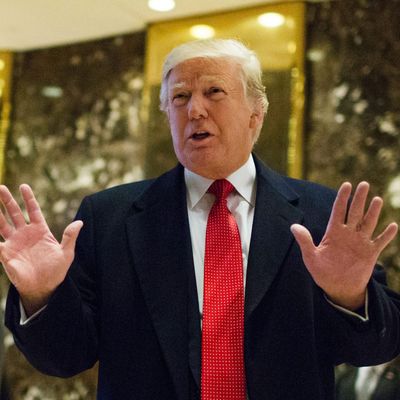
The president-elect woke up Tuesday morning, logged onto Twitter, and canceled an “order” of new Air Force One jets — sending the share price of one of America’s largest companies sliding in the process.
It’s not clear how Trump arrived at that $4 billion figure. The projected fiscal cost of the Air Force One program from 2015 to 2021 is $2.87 billion, according to budget documents obtained by Reuters. The Air Force has already awarded Boeing an initial contract of roughly $26 million, to conduct cost estimates on the White House’s desired features for the plane, which include a more secure system for communicating in the midst of a nuclear war (an innovation that’s looking more and more timely). In July, the Defense Department provided the company with a $127.3 million contract to develop “interior, power and electronic specifications” for the plane, according to aviation-industry publication FlightGlobal.
It’s also unclear why Trump decided to publicly “cancel” these contracts now, when he is still weeks away from having the authority to do anything of the kind. (Talking Points Memo notes that Trump’s tweet was sent 20 minutes after the publication of a Chicago Tribune story on Boeing CEO Dennis Muilenburg’s antipathy for Trump’s trade policies).
“The plane is totally out of control. It’s going to be over $4 billion for Air Force One program and I think it’s ridiculous,” Trump told reporters in the lobby of Trump Tower, shortly after sending his tweet. “I think Boeing is doing a little bit of a number. We want Boeing to make a lot of money, but not that much money.”
Boeing responded to Trump’s remarks in a statement obtained by CNBC:
“We are currently under contract for $170 million to help determine the capabilities of these complex military aircraft that serves the unique requirements of the President of the United States,” The aviation giant said. “We look forward to working with the US Air Force on subsequent phases of the program allowing us to deliver the best planes for the President at the best value for the American taxpayer.”
Boeing’s share price fell 1.6 percent following Trump’s tweet, to a low of $149.75 — but, as of this writing, its stock has recovered to $151.33, just 0.55 percent below the pre-tweet price.
Nonetheless, politicians’ tweets have moved markets (particularly in pharmaceuticals) many times over the past few months. And, assuming the president-elect does not delete his account upon inauguration, we’re likely to see quite a bit more Twitter-induced volatility over the next four years.






























